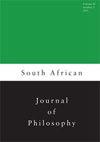“乌班图的终结”:马托利诺怀疑论的延伸
IF 0.2
3区 哲学
0 PHILOSOPHY
引用次数: 0
摘要
Bernard Matolino在与Wenceslaus Kwindingwi的联合文章1中宣布结束乌班图。他们认为,这一宣言是乌班图在现代非洲社会实践和理论上失败的结果。这一宣言引发了强烈的反应,对这些反应的分析表明,有必要不断质疑非洲的理想和信仰及其与现代非洲思想的相关性。在这篇文章中,我认为Kwindingwi和Matolino的论点与Matolino对非洲社群主义的更广泛怀疑是一致的。在其他作品中,他坚持认为,试图在非洲社群主义思想中建立后殖民非洲哲学的理论和实践基础,夸大了其功能。我的目的是表明,正如《乌班图的终结》中所展示的那样,马托利诺的苏格拉底过程和结果旨在对旨在指导现代非洲思想的传统思想产生高质量的理解和合理的辩护。拒绝主义的做法应该被视为一种推动,使对非洲理想和信仰的倡导,如乌班图,与对它们的了解以及它们在现实中的运作方式相匹配。本文章由计算机程序翻译,如有差异,请以英文原文为准。
“The end of ubuntu”: An extension of Matolino’s scepticism
In a joint article1 with Wenceslaus Kwindingwi, Bernard Matolino declared an end to ubuntu. The declaration, they argue, is a result of the failure of ubuntu in practice and theory in modern African societies. This declaration triggered strong reactions, and an analysis of these responses suggests the need for continuous interrogations of African ideals and beliefs and their relevance to modern African thought. In this article, I argue that Kwindingwi and Matolino’s argument is in line with Matolino’s broader scepticism about Afro-communitarianism in general. In other works, he insists that attempts to theoretically and practically ground postcolonial African philosophy in ideas of Afro-communitarianism exaggerate its functionality. I aim to show that Matolino’s Socratic process and the outcomes, as demonstrated in the “The end of ubuntu”, aim to produce quality understanding and reasoned defence of the traditional ideas aimed to guide modern African thought. The rejectionist approach should be seen as a nudge to make the advocacy for African ideals and beliefs, such as ubuntu, match up with the knowledge of them and how they operate in reality.
求助全文
通过发布文献求助,成功后即可免费获取论文全文。
去求助
来源期刊

SOUTH AFRICAN JOURNAL OF PHILOSOPHY
PHILOSOPHY-
CiteScore
1.00
自引率
0.00%
发文量
19
期刊介绍:
The South African Journal of Philosophy (SAJP) is the official publication of the Philosophical Society of South Africa. The aim of the journal is to publish original scholarly contributions in all areas of philosophy at an international standard. Contributions are double-blind peer-reviewed and include articles, discussions of articles previously published, review articles and book reviews. The wide scope of the South African Journal of Philosophy makes it the continent''s central vehicle for the publication of general philosophical work. The journal is accredited with the South African Department of Higher Education and Training.
 求助内容:
求助内容: 应助结果提醒方式:
应助结果提醒方式:


